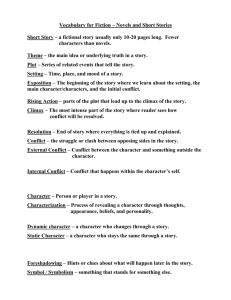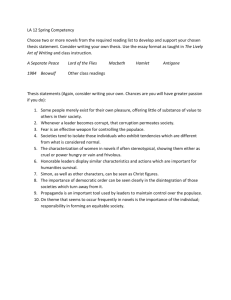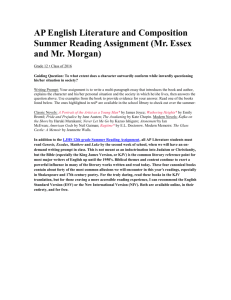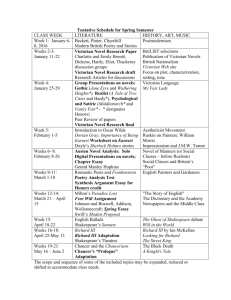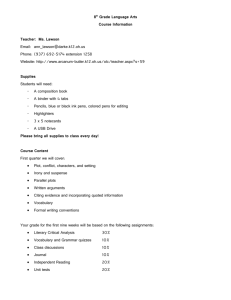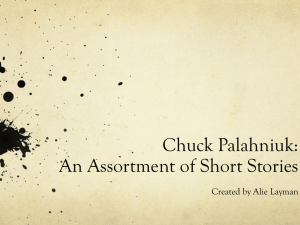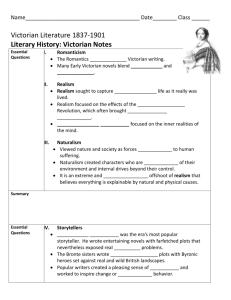Abstracts - University of Hull
advertisement
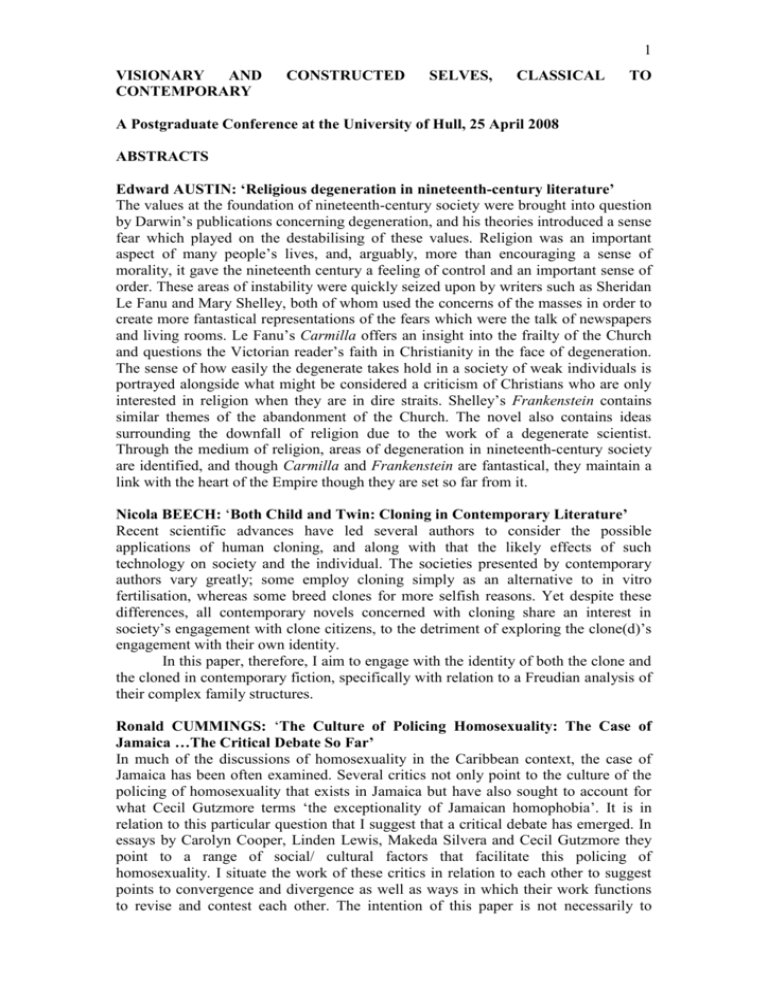
1 VISIONARY AND CONTEMPORARY CONSTRUCTED SELVES, CLASSICAL TO A Postgraduate Conference at the University of Hull, 25 April 2008 ABSTRACTS Edward AUSTIN: ‘Religious degeneration in nineteenth-century literature’ The values at the foundation of nineteenth-century society were brought into question by Darwin’s publications concerning degeneration, and his theories introduced a sense fear which played on the destabilising of these values. Religion was an important aspect of many people’s lives, and, arguably, more than encouraging a sense of morality, it gave the nineteenth century a feeling of control and an important sense of order. These areas of instability were quickly seized upon by writers such as Sheridan Le Fanu and Mary Shelley, both of whom used the concerns of the masses in order to create more fantastical representations of the fears which were the talk of newspapers and living rooms. Le Fanu’s Carmilla offers an insight into the frailty of the Church and questions the Victorian reader’s faith in Christianity in the face of degeneration. The sense of how easily the degenerate takes hold in a society of weak individuals is portrayed alongside what might be considered a criticism of Christians who are only interested in religion when they are in dire straits. Shelley’s Frankenstein contains similar themes of the abandonment of the Church. The novel also contains ideas surrounding the downfall of religion due to the work of a degenerate scientist. Through the medium of religion, areas of degeneration in nineteenth-century society are identified, and though Carmilla and Frankenstein are fantastical, they maintain a link with the heart of the Empire though they are set so far from it. Nicola BEECH: ‘Both Child and Twin: Cloning in Contemporary Literature’ Recent scientific advances have led several authors to consider the possible applications of human cloning, and along with that the likely effects of such technology on society and the individual. The societies presented by contemporary authors vary greatly; some employ cloning simply as an alternative to in vitro fertilisation, whereas some breed clones for more selfish reasons. Yet despite these differences, all contemporary novels concerned with cloning share an interest in society’s engagement with clone citizens, to the detriment of exploring the clone(d)’s engagement with their own identity. In this paper, therefore, I aim to engage with the identity of both the clone and the cloned in contemporary fiction, specifically with relation to a Freudian analysis of their complex family structures. Ronald CUMMINGS: ‘The Culture of Policing Homosexuality: The Case of Jamaica …The Critical Debate So Far’ In much of the discussions of homosexuality in the Caribbean context, the case of Jamaica has been often examined. Several critics not only point to the culture of the policing of homosexuality that exists in Jamaica but have also sought to account for what Cecil Gutzmore terms ‘the exceptionality of Jamaican homophobia’. It is in relation to this particular question that I suggest that a critical debate has emerged. In essays by Carolyn Cooper, Linden Lewis, Makeda Silvera and Cecil Gutzmore they point to a range of social/ cultural factors that facilitate this policing of homosexuality. I situate the work of these critics in relation to each other to suggest points to convergence and divergence as well as ways in which their work functions to revise and contest each other. The intention of this paper is not necessarily to 2 further this debate but rather it seeks to outline the critical debate as it has emerged so far. Alex DAVIES: ‘“I build my bellowing ark”: The Composition of Dylan Thomas's “Prologue”’ ‘Prologue’ was the last poem that Dylan Thomas completed during his lifetime and is a public manifesto of his poetic vocation, addressed to his readers: ‘At poor peace I sing / To you, strangers’ (lines 23-24). It prefaces his Collected Poems and is a positive assertion of the poet speaker’s protective love of his locality as he builds his ‘bellowing ark’ of words against the ‘flood’ of nuclear destruction. The poem’s final assertion is uplifting and affirmative: ‘My ark sings in the sun/ At God speeded summer's end/ And the flood flowers now’ (lines 100-102). However, access to the manuscripts reveals a greater ambivalence towards the poet speaker’s ability to withstand an imminent threat to his insular world. Indeed, in a long transitional phase in Thomas’s drafting of the poem he expresses indolence and apathy, even doubting the ability of his words to make an impact. Through the process of drafting the poem, there are significant shifts in authorial stance and even in the intended audience of the piece. The poem began as a self-deprecating comic portrait, where, returning to Wales from one of his American reading tours, Thomas caricatures himself as the drunken poet of his American legend. However, as Thomas explained ‘it was going to be a piece of doggerel written to someone in the States on my return to Wales, but soon grew involved and eventually serious.’ This paper will concentrate on key points in Thomas's writing process in order to chart the way in which this poem developed from a piece of ephemeral correspondence to a declamation of Thomas's commitment to his art. Ashley FISHER: ‘Discourses of Death in the Fiction of Margaret Harkness’ Margaret Harkness (1854-1923), socialist, feminist and novelist, wrote novels under the pseudonym ‘John Law’ which attempted to bring the living conditions of the urban poor in late nineteenth-century England to the attention of the middle-class reading public. The working classes in Harkness’ fiction conform to neither of the common tropes - the collective fearsome mob or the individualist foundling-madegood - often assigned to the proletariat in Victorian literature. Instead of either the demonised or idealised objects these tropes offer, Harkness’ working class characters are presented as subjects within a realist socio-economic context. This paper will explore the ways in which the theme of death in two of Harkness’ novels - Out of Work (1888) and A Manchester Shirtmaker (1890) - can be seen as a battleground between bourgeois and proletarian discourses. Both of these novels are framed by death and by the conflicting discourses of the bourgeoisie and the working classes in terms of assigning narrative meaning to death. The paper will consider the extent to which the control over death that the working-class protagonists attempt to exert can be seen to be a form of narrative control, and will examine the means by which the ideological structures of the bourgeoisie displace the proletarian discourses with their own ‘official’ discourse. Kathleen GLEDHILL: ‘Dial “M” for Mythology: The Metamorphosis of the Myths and Metamyths of Medea’ Murder, masochism, maternity, misandry, mayhem, misogyny and magic… each interpretation of the myths and metamyths of Medea focuses on any or all of the above and each time the story of Medea is transformed. According to Pausanias, Euripides added the notorious act of infanticide; a myth that contemporary twentiethcentury female writers have striven to portray sympathetically or deny altogether, but 3 to what ends? Could infanticide be the ultimate act of radical feminist rebellion against the patriarchal shackles of gender performance? Do contemporary authors neutralise this aspect of the Medea story so that she is no longer a monstrosity and affront to her sex? Can an affiliation between her and the supernatural diminish the horror of such an act? Or are these women correcting the slanderous accusations of a misogynistic playwright who was bribed by some guilty Corinthians? These questions will be considered in relation to Jane Cahill’s oral narrative, Medea’s Story, Liz Lochhead’s play, Medea, and Christa Wolf’s novel, Medea. Sarah MAUDSON: ‘“A Broken Pot and a Little Straw”: The Obscurity of Gender in Virginia Woolf’s Orlando’ Virginia Woolf’s Orlando is an experimental manipulation of gender expectations, and a radical inversion of the auto/biographical tradition. Orlando is a shrewd examination of gender as a construct, and an exploration into a world in which gender boundaries become blurred and obscured. In a fascinating and controversial way, Orlando questions what identity means without gender as a basis and, in doing so, questions the very foundation of all human relationships. This paper will concentrate upon such gender obscurity, attempting to analyse the effect such confusion has upon the reader and their own sense of gendered identity. It will also address sexual relationships within Orlando, considering Woolf’s unique construction of characters and their relation to each other. Finally, the paper will comment upon Orlando’s ability to embrace both masculine and feminine attributes, whilst also remaining believable and tangible. Madoka NAGADO: ‘Different Aspects of Perspective in the Work of H.G.Wells’ In the preface of The Country of the Blind, and Other Stories, Wells describes his composition by saying ‘I was peering into remote and mysterious worlds.’ This unique sense of ‘peering’ has often taken the form of unusual ‘visuality’ in his works, such as ‘The Crystal Egg’ (1897) and ‘The Door in the Wall’ (1906). Sight has always been given importance among our five senses and in terms of literature, it can be metaphorically interpreted in various ways: for instance, as a symbol of desire, power, taboo, etc. Although we can find that ‘seeing’ as a power is expressed both in ‘The Country of the Blind’ (1904) and ‘The Invisible Man’ (1897), Wells gives an ironic twist to them: the fates which both main characters meet is tragic, or at least untoward. Why does Wells describe the power of ‘seeing’ not in a positive, but in such a negative way? The comparison between these two novels will highlight Wells’ view of the relationships between the period’s society and its people. Bob OWEN: ‘Without Contraries Is No Progression: Two Approaches To The Mystical In Hughes' Early Work’ Ted Hughes' understanding of the mystical evolved as his poetry matured, and over time, from an early fascination with astrology to the Tarot sequences of his final work Birthday Letters, it came to be one of the central themes of his prolific output. In this conference paper, I shall investigate the beginnings of the change in Hughes' perception of the mystical by reference to his first two volumes of poetry, The Hawk in the Rain and Lupercal. Firstly I will examine the seemingly dialectical opposition that exists between Man and Nature in THITR and the way in which mysticism functions as a direct spiritual connection between the two. I will also consider to what extent Hughes' animal totemism is essentially a symbolic language based in the world's myth-kitty, designed to control these summoned spiritual energies, and then, finally, how this technique is altered and adapted in his second volume, Lupercal, which has a considerably different stylistic approach. 4 Natalia TEJEDOR SANZ: ‘Choosing the Slain and Furnishing the Table: Jacob Grimm’s Valkyries’ While Old Norse literature was not rediscovered during the 19th century, it was then that it gained a whole new significance as a factor which contributed to the creation of new national identities. Jacob Grimm wanted, in Deutsche Mythologie (1835) to ‘collect and set forth all that can be known German heathenism, and that exclusively of the complete system of Norse mythology.’ A chapter of Deutsche Mythologie is devoted to the study of the Weise Frauen, among which valkyries are included. This paper examines Grimm’s analysis of valkyries and explores the notion that this analysis might serve one purpose of which perhaps Grimm himself was not aware- to create a mythology which would correspond with and reinforce the moral values and ideal social structures of his time. Sunita SELVARAJ: Wilkie Collins’ Prototypical “New Woman” as Wife in The Law and the Lady, Man and Wife and Basil’ There has always been much attention given to women in the works of Wilkie Collins. Among the Victorian sensation writers, Collins may well be the male author who has devoted most attention to the development of female characters. Most often within these novels, the female character is studied as a fallen woman and indeed there seems to be a proliferation of ‘degenerate’ and ‘sinful’ women among his works. Collins’ treatment of women can provide rich fodder for the researcher who is interested in the ‘New Woman’. This paper will look at a specific way in which Collins’ women seem to be represented, namely the married woman in her role as a wife. The ‘New Woman’ is a term which was given to factual and fictional women who were shrugging off their Victorian skins for something new. Although this term comes into usage in the late Victorian period and was not necessarily used to describe women in sensation writings, this paper will seek to prove that the New Woman did exist in her embryonic state in these writings and especially when pertaining to the works of Wilkie Collins. One of the major characteristics of the later ‘New Woman’ is her ability to be independent of male influence in her life though she is not yet fully independent of men. This paper will focus on the married woman in her role as a wife who does not necessarily depend on her husband for her identity or survival and strives to create her own niche in life. Three novels are chosen for this purpose namely The Law and the Lady, Man and Wife and Basil. These particular novels are from the earlier works of Collins and each deal with the role of the married woman in vastly different ways. The marriages that happen in each of these novels do not seem to fit the Victorian pattern. There is a secret marriage in Basil, a ‘mistaken’ marriage in Man and Wife and a marriage which starts of on the wrong foot in The Law and the Lady. Each of the wives handles their situation in quite different ways and this is where Collins’ skill in creating a ‘New Woman’ is most apparent.

